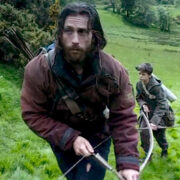Interview with I AM MOTHER Director Grant Sputore
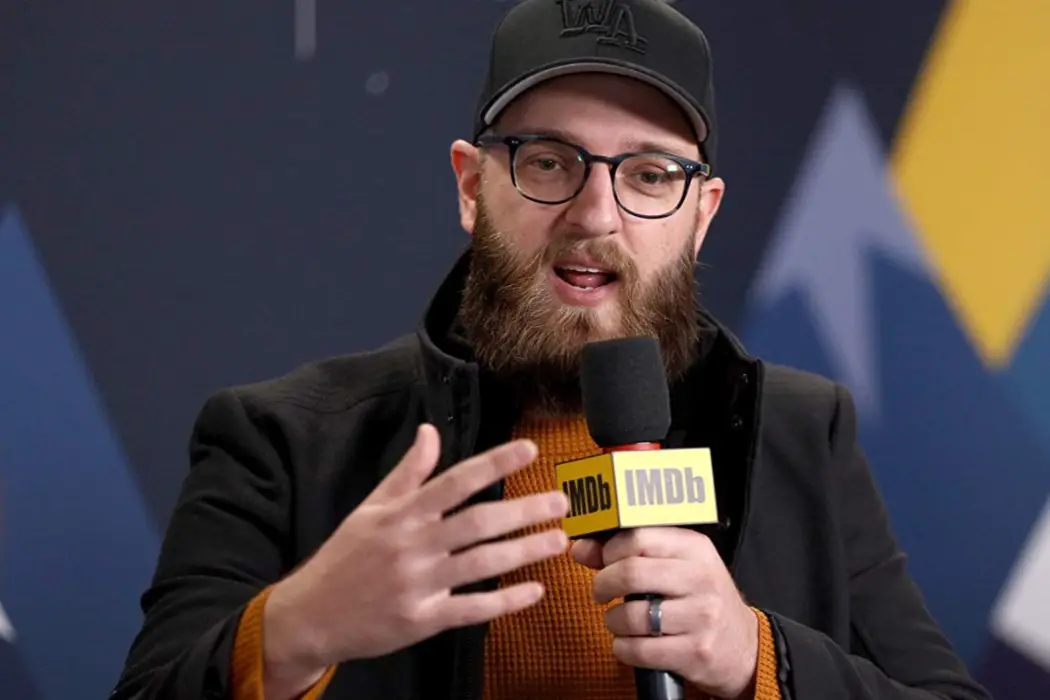
Alex is a 28 year-old West Australian who has a…
If one looks into the sci-fi genre over the past year, it readily becomes apparent that as a whole, it has been a sensational period for the genre, for both realms of film and television. The recent revivals of Star Trek, The Twilight Zone and Lost in Space have reminded audiences of the limitless potential of the speculative fiction, whether these fantastical tales take place on Earth or in the depths of space.
This year alone has rewarded us with Claire Denis’ psychologically intense High Life, the bombastic Chinese blockbuster The Wandering Earth and the trio of equally Earth-shattering chapters of the Marvel Cinematic Universe, titles that’ll fill our multiplexes for the imaginable future. In-between the latest season of the technologically-anxious Black Mirror and the Ridley Scott-inspired aesthetics of Altered Carbon lies Netflix’s latest acquisition I Am Mother, the debut feature from West Australian director Grant Sputore.
I Am Mother centres on the maternal bond between Mother (voiced by Rose Byrne, performed by Luke Hawker), a humanoid robot and the human child (Clara Ruugard) she has raised in an underground research facility, whose high-tech capabilities work to revive the human race after an undetermined apocalypse has occurred above. This peaceful existence is disrupted by the arrival of another woman (Hilary Swank), whose war-torn features and general distrust of robots suggests that Mother might not be quite the protective figure that she’s been programmed to be, leading to one tense love triangle – in the pejorative sense.
I had the chance to sit down and speak with Grant Sputore in his hometown of Perth about his new film, getting picked up by Netflix, the film’s influences and how to make an original sci-fi film in 2019.
Alex Lines for Film Inquiry: Last year there was an article highlighting the recent on-screen successes of you, Zak Hilditch and Ben Young, and interestingly enough all three of you have ended up with projects premiering on Netflix.
Grant Sputore: Yeah, with all different paths to get there as well. You know like Ben’s film was a massive studio film that ended up with Netflix [Extinction], mine was an independent film that ended up on Netflix and Zack’s movie [1922] was commissioned by Netflix. They’re just so big and they have so many different business models, but what they certainly have is an audience. We got the numbers the other day and we’re not allowed to say what they are, but they’re really impressive. Like, millions upon millions of people have seen this movie, which is beyond the scope of what any distributor could promise us. I feel like, especially international distribution might be tricky, especially now with it’s getting so crowded.
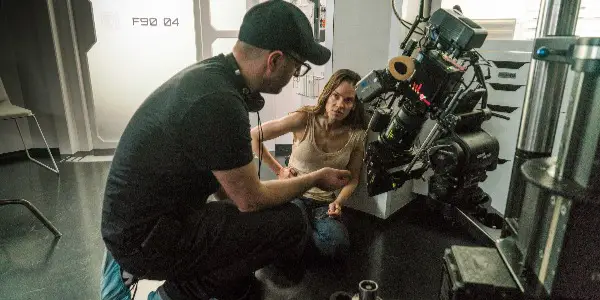
How has your experience been with Netflix? Are you seeing them put in the effort to support filmmakers, in terms of being able to help an independent film like yours secure international distribution, which is something quite hard to achieve nowadays, especially for Australian films?
Grant Sputore: Absolutely. I mean, like I mentioned, we were an independent film made in Adelaide by a couple of first time filmmakers. You know, you make a movie like that and you pray that it finds its way into a festival and you hope that it finds its way to an audience, right? So to have it go to Sundance and then to picked up by a cutting edge distributor who can give you access to the largest audience that has ever been assembled in the history of mankind, is the dream really, especially with a film like ours where we’d love it to be part of the pop culture, or at least the underground scene.
You know, the sort of people who go to comic conventions and they’re wearing Daughter cosplay, like fans go and make art and people go on Reddit and write fan fiction. Like, you need to access enough people to find those fans, which is what Netflix offers.
I imagine Ridley Scott is a major directorial influence for you, and he’s someone that also started his career in advertising. From your perspective, how do you think your background in commercial filmmaking has helped shaped your feature-length sensibilities?
Grant Sputore: I wouldn’t have been able to make this film without the training ground that was making commercials really. Like it got me on set, it got me telling stories and it got me working with actors. And it got me comfortable with visual effects, which is obviously a big part of the experience of making I Am Mother.
When you first originally met I Am Mother‘s co-writer, Michael Lloyd Green, you initially wrote a Western together that ultimately fell apart. Can you talk about that project, and is that something you’d revive now?
Grant Sputore: It’s a tricky one because we both love that project so much. We love the characters, we love the world, we love the concept, but you learn things along the way about what’s a viable project and what the market will support. I don’t think a film like that gets made until we have a hell of a lot of power and we have actors that want to be in it – a sort of profile that they can get a movie greenlit.
And even then, I’m not sure the numbers stack up because it’s a challenging piece of material and I’m not sure the audience is there at the right size to support the budget of that project. But in the streaming world, like as a series, it probably makes more sense, with a mature audience who are more happy to go dark and complicated in a series moreso than a film.
This film began from its appearance on the Black List in 2016. How was that experience and how did that help start production?
Grant Sputore: It helps a lot because it’s an endorsement that helps your script stand out from the crowd. There are so many scripts going around Hollywood and everybody’s trying to get their movie made, so anything that can make you stand out from the pack is a good thing. It’s stuff like being able to say that we were on the Black List that made Hilary Swank take us seriously and ultimately agree to be part of the project. I don’t know if without that vote of confidence that we would have been taken so seriously.
If it had never happened, would you had made it regardless?
Grant Sputore: That was the original plan. We were financed to make it in Western Australia, that’s where we started, but as we really broke down the details of the piece, we realized we couldn’t – it was stage base that was the problem. The film is so interior and it’s a wholly created world and we needed enough stages to be able to get the story told. In Adelaide, they’ve got two sound stages, the largest of which is larger than the one we have here – even that wasn’t enough, we had also had to use a third stage.
Do you think a lack of a proper film studio in Perth hurts the industry here?
Grant Sputore: It’s hard to know, I don’t proclaim to know the larger kind of marketplace and how much footloose production there is out there that would come to Perth. But in this instance it did, like we would have made it here and would have preferred to make it here, but we couldn’t, so I can’t claim that there’s a lot of projects like this and that Perth is missing out all the time because of it.
If you look at what’s happening in South Australia, they’re certainly in the middle of a boom. That’s partly to do with rebates and partly to do with infrastructure, like the upcoming Mortal Kombat film wouldn’t be shooting in South Australia if it wasn’t for their sound stage and Simon McQuoid, the director, lives in Perth!
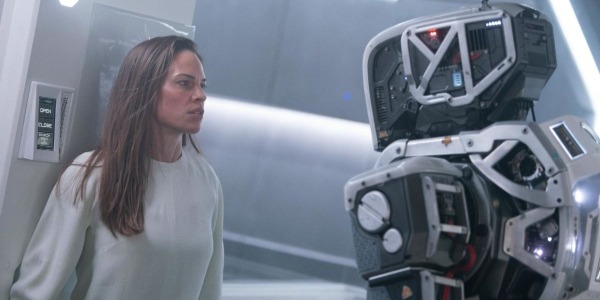
Can you talk about this script’s development? Did it begin as something completely different?
Grant Sputore: The outline for the film was sort of written in about three days. Once Michael and I tweaked on the central idea, the story largely fell into place pretty quickly. But even then it took a year and about four or five drafts to get the script to the point that we were ready to send it out to the world. So knowing the story that you want to tell and knowing who your central character is and knowing what the conceit of the film is isn’t enough. Like, even within that, there’s so many different ways to skin it. You just need to go through that process and get to the end result that you’re striving for.
[Mild Spoilers for I Am Mother] Was there ever a hesitation to leave the underground bunker?
Grant Sputore: It was really intentional to leave the bunker because most films in this would – there are a number of them that are like three characters in one location – very rarely do you get to get out at that location. It’s a trope of the genre almost, probably largely driven by budget, that a story like this typically ends with one character going out the front door, the light blaring in as they sort of like fade off into the unknown. Even Ex-Machina, which is like one of the classiest examples there is, does exactly that, there is only one shot that’s not in the facility at the end of the film.
That’s how Cube ends and 10 Cloverfield Lane spends a little bit of time immediately outside the bunker. But most movies just don’t go in there for whatever reason and I wanted to subvert that expectation, like the fact that we would go outside and we actually see the outside world was in there for the very first draft.
In terms of influence, many have likened the film to Moon, Ex-Machina, The Terminator and Silent Running. What are some other films/directors, either aesthetically or narratively, that you drew upon that one might not pick up on upon first watching the film?
Grant Sputore: It’s interesting because Ex-Machina and 10 Cloverfield Lane certainly became points of inspiration along the way, but they didn’t exist when we started writing the story. So it’s funny how there’s obviously something in the zeitgeist that makes these sort of stories want to be told. In terms of influences that aren’t obvious, we talked a little bit about Let the Right One In – or even the remake Let Me In – in terms of the central relationship between a young child and a sort of supernatural unusual character, but ultimately like these things take the form that they want to take and what the narrative demands they take. Most of the stuff that’s an influence is pretty subconscious and, and perhaps more aesthetic than anything.
Like the actual structure of the story is really driven by the premise. Once we knew who Daughter was and where she was, everything after that is really just putting one foot in front of the other and were determined by the elements of play. Michael and I talk a lot about story math and about how you have to carry the one from here to there and you have to carry these things through. When you set something up and you have to pay it off etc. So the mechanics of the story are mostly true to themselves rather than true to any external references really.
[Spoilers for I Am Mother to follow] Did any of these films influence I Am Mother‘s ambiguous ending?
Grant Sputore: The ending is not particularly ambiguous in my mind. There’s certainly unanswered questions, it depends on what you’re talking about. There are things that are designed to be unclear or that leave room for the audience for them to go away and talk about, like to get on Reddit and come up with their fan theories etc. In talking about references, Michael and I talked specifically about the ending and doing it in the mode of stuff like Inception or Blade Runner, where you’re left with something to talk about with your friends.
But from Daughter’s perspective, what Daughter has experienced is complete in our opinion. She goes from being a young girl who believes what she’s told to believe and does what she’s told to do, to ultimately becoming her own person who can make up her own mind about what’s right and what’s wrong. That’s completely independent of everyone around her and and she becomes the Mother of the title at the end of the film. That’s a complete and satisfying arc, but then there’s mysteries beyond that about where the story could go next.
When envisioning a sci-fi world, did you lean towards more pragmatic, real-world possibilities, or more fantastical technologies?
Grant Sputore: Probably the most fantastic thing in the whole film is being able to just gestate a baby in 24 hours. Everything else is reasonably grounded and right around the corner, even Mother herself. When those artificial intelligences get switched on, they have the potential to go very far, very quickly. They are exactly the kind of people that could crack gestating a human in 24 hours. AI threatens to be orders of magnitude smarter than humans.
It’s like if we’re dogs running around thinking that we’re clever and that we can do tricks, robots will be like humans to dogs effectively, they’ll be able to do things that seem absolutely bat shit crazy. So I don’t think anything is beyond the reach of what these robots might be able to do in the same way that a dog can imagine making a mobile phone.
In terms of the design of the bunker itself, definitely we wanted everything to be as recognizable as possible. Even Mother is really inspired by the robots out of Boston Dynamics and we didn’t want it to look overly slick or overly polished or overly Sci-Fi like, we wanted at least some of that for the satisfaction of a Sci-fi audience, but I think it’s even more satisfying if you can believe it and the shortest path to that result is referencing stuff that’s real.
Speaking of the robot itself, how did WETA Workshop get involved?
Grant Sputore: The WETA thing’s crazy, especially because I’m such a big fan of those guys. We just emailed them, we didn’t know anyone there. We didn’t have any special Hollywood connections, like Michael and I emailed them before we had any producers involved or anything like that. Just said, this is what we want to do, do you guys want to help us?
The pitch was intriguing enough just as a concept that they wanted to find out more, when we told them more and shared the script with them, they really bought into it on its own merits and particularly because it’s exactly the kind of film making that they got into the business to do. That kind of real practical magic, that type of in-camera effect is something that they’re the best in the world but they don’t get to do as regularly as anyone would like.
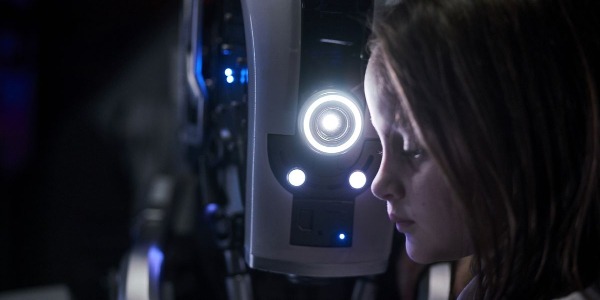
What was their specific involvement with the film?
Grant Sputore: They made the robot and that was basically it. They did some concept work on other aspects of the bunker, but then none of that stuff became part of the look of the movie beyond Mother’s dock. They designed the robot and the dock that Mother sits in, but that’s about the limit of the work that they did on the film.
But that’s a huge amount of work, to have this robot that’s designed and considered from every possible angle and that looks the part and services of the story but can also be made you know, like that you can actually put a human inside and not have that be wildly distracting.
I assume having a practical robot/actor there on set helped a lot in terms of coverage/blocking.
Grant Sputore: Yeah, it helped me in so many different ways. The relationship that the robot formed with the toddlers for instance, was really real. That was a whole process we went through, was getting them comfortable with the robot, getting excited about the robot and seeing the robot as a non-threatening thing. Then you get these genuine reactions, they aren’t just talking to a person in a green suit, its actually between a child and a robot basically.
Likewise with Clara and Hilary, they’re acting off a thing that’s going to be there, there’s less imagination, less artifice required – it’s real. I think as much as you can keep everybody on the same page, from the actors right through to the filmmaking crew, all the better. You can keep everybody focused and headed towards the same result.
What was it about Hilary Swank that for you, made her the perfect casting choice for the Outsider? Was it a particular role or a certain look you were after?
Grant Sputore: I think it’s both. I mean, I think the resilience and strength shown in Million Dollar Baby is pretty singular. We had the sense that she’s tough as nails in that movie, but she’s sweet as all heck, she’s lovely and she’s America’s sweetheart in that. I guess either from like a general impression that we had or a mix of other roles or just what we knew of her physicality, we knew that there was this bad-ass inside of her that we hadn’t really seen.
We just thought it would be a great part for her, but we never thought that she would do it because we planned to make it in Western Australia, to make it for as little as possible. It was only really as it gathered steam that we realised just how valuable people seemed to feel the screenplay was, and when it showed up on the Black List, it became plausible that she might want to be a part of it.
Where did Daughter’s fascination with Johnny Carson come from?
Grant Sputore: Mike and I thought a bit about what it would be that would fascinate this character stuck in that world. The one thing that she doesn’t have access to is people, the one thing she can’t do is have conversations with different people. And a talk show is just an endless parade of different folks talking about their lives, so we thought that would be fascinating to her, that she could just meet different people and get a hint of the whole world that she’s been ever been a part of.
For the Carson era specifically, we had a whole backstory for that, but there’s no way to know from the film. But we imagined that she basically started with the most recent clip of talk shows she had available to her and she just worked her way backwards through them and that she’s up to Carson on the timeline.
Was that a nightmare in terms of copyright?
Grant Sputore: No, I mean we basically knew we wanted these clips and then weirdly the Carson family trust has an online library that you can go and access and take clips from.
Film Inquiry thanks Grant Sputore for taking the time to talk with us.
I Am Mother is currently available to watch on Netflix.
What did you think of I Am Mother? Let us know in the comments!
Does content like this matter to you?
Become a Member and support film journalism. Unlock access to all of Film Inquiry`s great articles. Join a community of like-minded readers who are passionate about cinema - get access to our private members Network, give back to independent filmmakers, and more.








